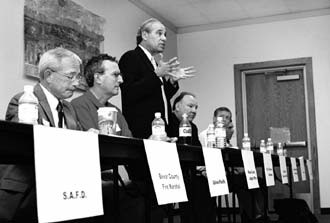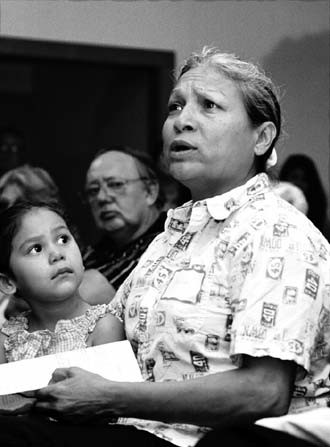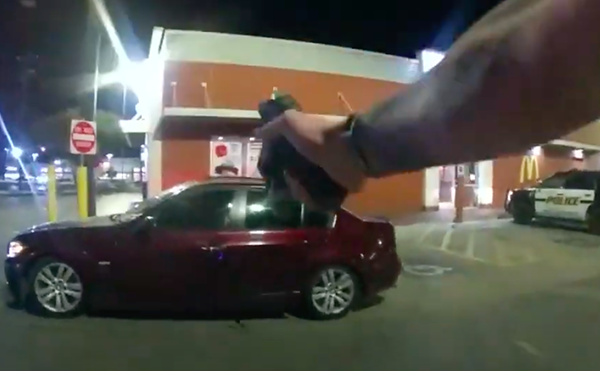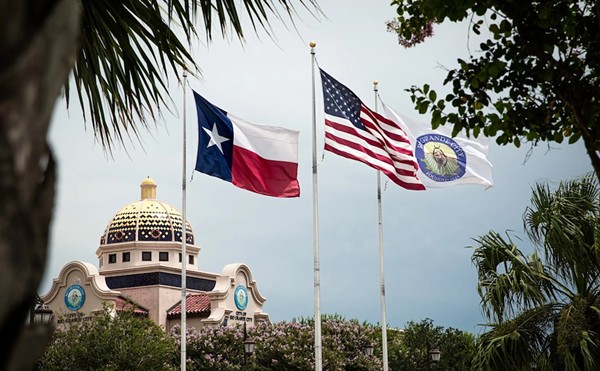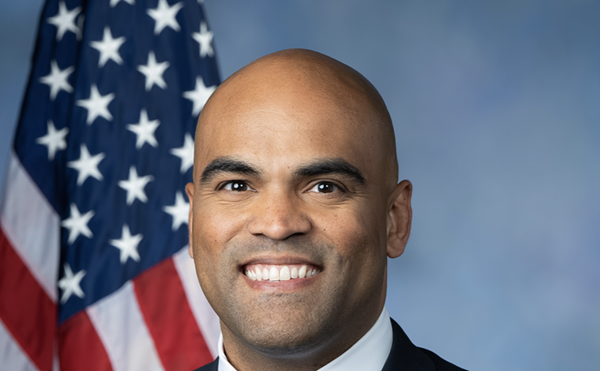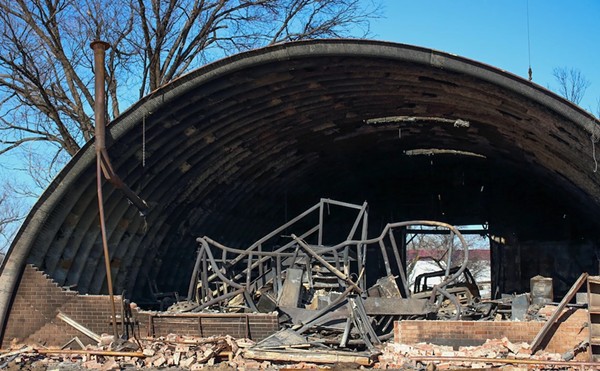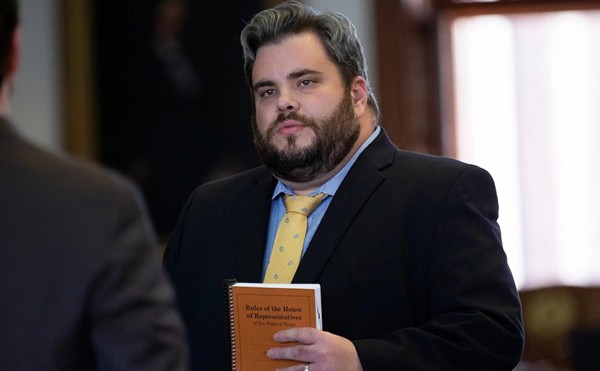| U.S. Representative Charlie Gonzalez spoke to concerned residents at Saturday's town hall meeting. (Photo by Laura McKenzie) |
It has been nearly three weeks since the derailment of a Union Pacific train that killed three people and injured dozens more, but along the stretch of Nelson Road where railroad tracks stitch together a comforter of cornfields and pasture land, iridescent green liquid still fills puddles the size of in-ground pools, a boxcar rests on its side like a bloated deer, and the remains of the red, white, and blue Union Pacific logo lie half visible, half blackened.
The land hasn't forgotten the train wreck, and neither have residents of southern Bexar County, who, at a July 17 town hall meeting recounted the confusion, panic, and information snafus that ensued after the early morning derailment on June 28 that spilled more than 10,000 gallons of diesel fuel on the ground and emitted 60 tons of chlorine gas into the air.
Union Pacific's preliminary reports point to human error as the cause of the crash, but the National Transportation Safety Board hasn't completed its investigation. Two people sleeping in a house near the tracks died, as did the engineer.
| A roundup of the town hall meeting Who attended: • U.S. Representative Charlie Gonzalez (D-San Antonio) • State Representative Ken Mercer (R-San Antonio) • Carl Mixon, Bexar County Fire Marshal • Capt. Nim Kidd, San Antonio Fire Department • Mark Davis, Union Pacific • Seth Mitchell, representing County Judge Nelson Wolff's office • Scott Harris, Environmental Protection Agency • Cameron Lopez, Texas Commission on Environmental Quality Conspicuous by his absence: • Bexar County Commissioner Robert Tejeda, whose district includes the affected area. The results • National Transportation Safety Board is investigating the derailment, including recordings of the the 911 calls and dispatch records. • Gonzalez' office is passing along names and complaints to local, state, and federal authorities and Union Pacific. • The EPA and TCEQ are continuing to monitor and clean up the site. For more information • U.S. Rep. Gonzalez 472-6195 or 202-225-3236 • Union Pacific: for health concerns, call 921-6728 or 921-6725 • Bexar County Judge Nelson Wolff 335-2626 • TCEQ Region 13 office in San Antonio, 14250 Judson Rd., 490-3096 |
"I didn't hear about it for 19 hours," added Delinda Wolak, who also lives on Cagnon Road. "I didn't know to turn my air conditioning off."
And to officials' surprise, other residents said they called 911 on the morning of the derailment, only to get a busy signal.
Bexar County Fire Marshal Carl Mixon said that while emergency crews can notify residents door-to-door, "it will take time to get to people," adding, "the media plays a big part of notifying the public."
However, since the derailment occurred before sunrise, few residents were watching television or listening to the radio to see or hear the alert. There are no emergency sirens; nor is there a reverse 911 system, in which residents receive a phone call with a recorded message telling them the nature of the accident and what to do.
Scott Harris of the Environmental Protection Agency's regional office in Dallas said that although local environmental officials were at the scene early on, he wasn't notified about the derailment and chlorine leak until 7:15 a.m. - almost two hours after the accident. The EPA began air monitoring at 8:30 that morning, he said.
The only person who told the panel he was satisfied with the handling of the emergency was Andy Britt, who works at the Dominguez State Jail, about five miles from the derailment. Of the 2,000 inmates and staff, six reported they felt ill. "The officials did a good job of notifying us," Britt said. "But there needed to be a horn that goes off."
Even a day after the derailment, residents still didn't know if they were supposed to evacuate or stay home. Selia Villarreal remained inside her mobile home for a week - without air conditioning, as emergency officials told residents to turn off any outside ventilation - and cared for her 3-day-old grandson. She said she received a call telling her to go to the Holiday Inn, but when she phoned the motel early that morning, she was told the office wasn't open until 8:30 a.m. "I couldn't chance it with my grandson," Villarreal said. "We were stuck. When we heard the trains passing by again, we knew it was clear."
Mixon said that the evening before Union Pacific officials moved the tanker, which still contained chlorine gas, residents were notified they might have to be evacuated to the Holiday Inn or would be asked to stay home, but to await further instructions.
| Selia Villarreal told the panel how she was affected by the city's alleged mishandling of notifications and evacuations after the train derailment. Her granddaughter, Krislynn Gomez, was seated beside her. (Photo by Laura McKenzie) |
Nor were area residents told why, on the day after the derailment, a huge cloud loomed over Macdona. It turned out to be lime, a neutralizing agent that can irritate the nose and eyes, which floated over the small community when the wind suddenly shifted.
"Things went wrong and things happened that shouldn't have," said U.S. Representative Charlie Gonzalez, who called the meeting. "People will be held accountable."
Railroads: blessing or curse?
In the late 19th century, Macdona, and other small southern Bexar County towns like Von Ormy, sprung up near the newly built Galveston, Harrisburg, and San Antonio Railway. "At one time, everybody wanted a railroad through their city," said Gonzalez. "It made your city."
Yet, now, due to derailments, accidents, traffic delays, deteriorating track conditions, speeding trains, and the hazardous cargo that they often carry, communities are less welcoming to the railroad.
| "We were stuck. When we heard the trains passing by again, we knew it was clear." — Selia Villarreal |
A Union Pacific line runs through Von Ormy, Macdona, and LaCoste, parallel to Macdona-LaCoste Road; small roads and even private driveways cross the tracks to the north, sometimes with no other entrance or exit.
If a derailment happened at the Cagnon Road crossing, residents who live along that road would be trapped; the other end of the road has been closed for two years because the Medina River has washed it out.
County Commissioner Robert Tejeda, who is responsible for addressing his district's concerns, nor a representative from his office attended the meeting. His spokesman said later that Tejeda was at a conference out of town.
"There is no evacuation route," said Wolak. "There are no back roads."
Residents asked Gonzalez and Union Pacific officials to relocate the tracks to less-populated areas.
"The federal government and railroad don't have the money to build a whole new system," Gonzalez said. "But speed and hazardous materials - we can do something about that."
But whether something will be done remains to be seen - about the tracks or about the derailment. In mid-July, The New York Times reported in a series of stories critical of Union Pacific that in one recent 18-month period, "seven federal and state courts imposed sanctions on the nation's biggest railroad for destroying or failing to preserve evidence in crossing accidents ..."
By the end of meeting, Union Pacific had promised to send employees to examine the Von Ormy tracks, but could not address the trains and their hazardous cargo that continue to run through the area. "You should spend the night here," said Wolak. "You wouldn't sleep." •

